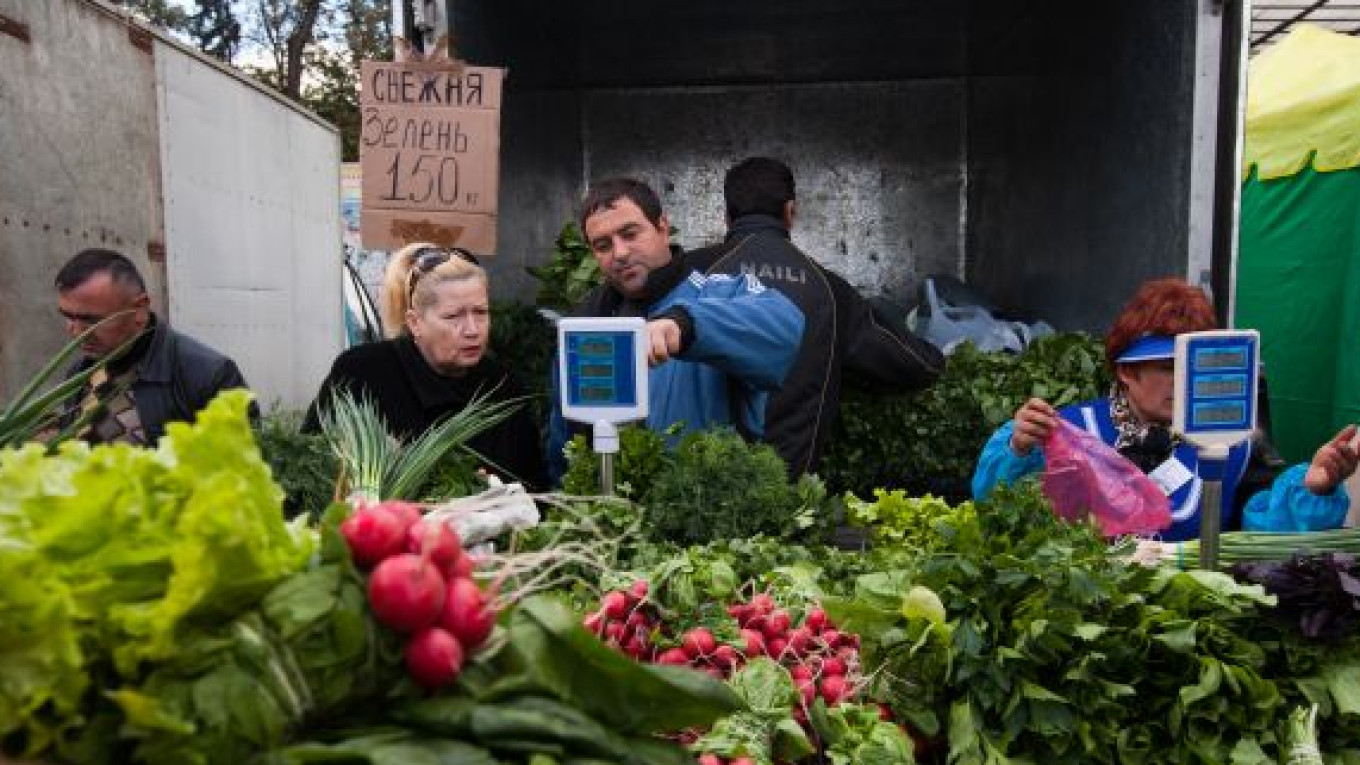Following a recent eruption of ethnically motivated street violence, Moscow's migrant-populated food markets and warehouses continue to serve as the front line in an ongoing fight against illegal immigrants declared by mayor Sergei Sobyanin.
The now notorious vegetable warehouse in Biryulyovo that became the site of violent riots Sunday is temporarily closed. Former tenants are moving their goods to other food bases, primarily in the Moscow region, news reports said Wednesday.
The upheaval in Biryulyovo followed the murder of a Russian citizen by an Azerbaijan native who supposedly had been working at the nearby vegetable warehouse, one of the largest in the city. Food markets and storage facilities are said to be the main places of employment for Moscow's millions of migrants from the Caucasus and Central Asia.
However, the grounds cited for shutting the site was not illegal immigrants but violations of sanitation norms.
Sergei Sobyanin, opening a meeting in the Moscow City Duma Wednesday, said that in this way the authorities were supporting the demand of Muscovites to bring order to the markets and warehouses and to stop illegal migration.
He said several hubs of criminal activity have recently been closed, including the Luzhniki and Emeral markets, hundreds of casinos and kiosks, and 30 small retail markets.
"Each decision was made with considerable effort. We felt resistance from every direction but persevered with it," Sobyanin said, Itar-Tass reported.
In an interview with Kommersant-Vlast magazine published Wednesday, the mayor, referring to the Biryulyovo vegetable warehouse, said that it bore "clear signs of migrant presence."
"Some of them were legal, some illegal. There were many Caucasus natives. I am informed that the owners themselves were originally from the Caucasus," he said.
The warehouse belongs to Noviye Cheryomushki holding company, one of the founders of which is Dagestan native Magomed Tolboev. Tolboev has received the title of Hero of the Russian Federation, and is a close ally of President Vladimir Putin.
The closing of the warehouse in Biryulyovo was no big deal, Tolboev said in a recent interview with Novaya Gazeta.
The company owns another 5,000 hectares of warehouse property in the Moscow region, he said, which serve as a supply base of fresh food daily to the capital.
"If someone wants to close that, he should bear in mind that it will bring collapse, and empty stomachs for [Moscow's] population," Tolboev said, adding that he had enough power to stop this from happening.
But Sobyanin is keen to impose more control over the retail sector and proposed that all stores, retailers in particular, be checked by sanitation control on a daily basis.
"The situation, in which a sanitary inspector comes to check retail outlets once in three years, should be changed ... That type of practice is idealistic and does not work here," Sobyanin said, Kommersant-Vlast reported.
The mayor also denied previous speculation in the media that closing big markets had been the result of the lobbying efforts of big retail chains.
Vladislav Korochkin, first vice-president of Opora Rossii, a nationwide public organization of entrepreneurs, said that while the law prescribes a planned check once every three years, investigators can scrutinize retailers at any time, if initiated by the customers.
It is physically impossible to check everyone, he added, and the result will be selective and thus biased attention. The measure is just an attempt to choke off a small retail sector that is already dying out, he said: "The market is being monopolized with every passing day."
Major retail chains see no problem with a proposal that they be examined more frequently for their compliance with sanitation norms or illegal immigrant regulation.
"We support the government's wish to establish control over what we call local or street retail. Although it is slippery ground, the time has come to do so," Vladimir Rusanov, a spokesman for the X5 Retail Group, said. "As for us, we are already being checked on a regular basis and do not employ any illegal immigrants, so there is nothing to panic about."
The quality of shops will increase as a result of frequent scrutiny, a spokesman for Dixy Group, a major food retailer, said. The chain is fully supportive of the mayor's proposals.
But Vladislav Korochkin criticized Sobyanin for a lack of strategic thinking and acting to put out the fire without having taken any preventive efforts.
"Where were the authorities before the tragic events [in Biryulyovo on Sunday]? Violations are being revealed now, but there were no measures taken earlier. And past practice suggests that everything can be resolved in two days," Korochkin said.
Similar emergency action was taken in August when a policeman was assaulted in Matveevsky market in Moscow. Thousands of migrants were later detained after a series of police raids on this and other markets in the city.
Contact the author at a.panin@imedia.ru
A Message from The Moscow Times:
Dear readers,
We are facing unprecedented challenges. Russia's Prosecutor General's Office has designated The Moscow Times as an "undesirable" organization, criminalizing our work and putting our staff at risk of prosecution. This follows our earlier unjust labeling as a "foreign agent."
These actions are direct attempts to silence independent journalism in Russia. The authorities claim our work "discredits the decisions of the Russian leadership." We see things differently: we strive to provide accurate, unbiased reporting on Russia.
We, the journalists of The Moscow Times, refuse to be silenced. But to continue our work, we need your help.
Your support, no matter how small, makes a world of difference. If you can, please support us monthly starting from just $2. It's quick to set up, and every contribution makes a significant impact.
By supporting The Moscow Times, you're defending open, independent journalism in the face of repression. Thank you for standing with us.
Remind me later.


